 Petzlover
Petzlover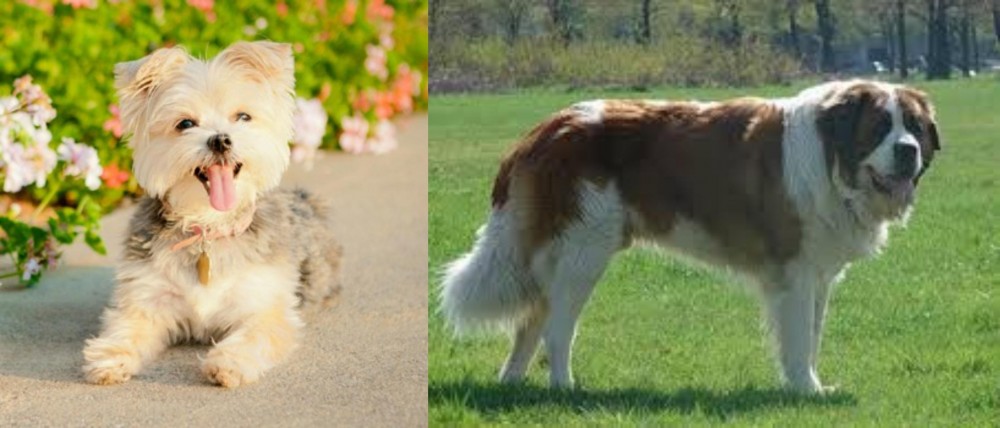 Morkie is originated from United States but Moscow Watchdog is originated from Russia. Morkie may grow 39 cm / 15 inches shorter than Moscow Watchdog. Morkie may weigh 62 kg / 136 pounds lesser than Moscow Watchdog. Morkie may live 4 years more than Moscow Watchdog. Morkie may have less litter size than Moscow Watchdog. Morkie requires Low Maintenance. But Moscow Watchdog requires Moderate Maintenance
Morkie is originated from United States but Moscow Watchdog is originated from Russia. Morkie may grow 39 cm / 15 inches shorter than Moscow Watchdog. Morkie may weigh 62 kg / 136 pounds lesser than Moscow Watchdog. Morkie may live 4 years more than Moscow Watchdog. Morkie may have less litter size than Moscow Watchdog. Morkie requires Low Maintenance. But Moscow Watchdog requires Moderate Maintenance
 These cute little dogs originated in the United States. As a cross between a Maltese Poodle and Yorkshire Terrier, the idea of breeders was to bring out a gorgeous looking little dog that would be low shedding.
These cute little dogs originated in the United States. As a cross between a Maltese Poodle and Yorkshire Terrier, the idea of breeders was to bring out a gorgeous looking little dog that would be low shedding.
The Morkie Poo inherits this low shedding characteristic from the poodle side of things. It is not precisely clear as to when the first Morkie was born, but these days he is as popular as ever.
Certainly, both the parent breeds are recognized with kennel clubs but the Morkie isn’t.
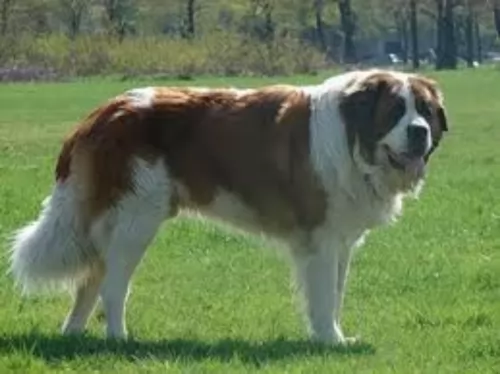 The Moscow Watchdog is a cross between the Caucasian Oytcharka, the St. Bernard and other Russian hound dogs. This large breed dog was developed in the Soviet Union for the purpose of being guard dogs. It had the awareness and assertiveness of the Oytcharka and the size, intelligence and attractiveness of the St. Bernard. The breed is common in Russia today but hardly seen anywhere else even though they were exported to the United States and Europe. The breed had the first U.S. born litter in 2015 and it is not AKC recognized.
The Moscow Watchdog is a cross between the Caucasian Oytcharka, the St. Bernard and other Russian hound dogs. This large breed dog was developed in the Soviet Union for the purpose of being guard dogs. It had the awareness and assertiveness of the Oytcharka and the size, intelligence and attractiveness of the St. Bernard. The breed is common in Russia today but hardly seen anywhere else even though they were exported to the United States and Europe. The breed had the first U.S. born litter in 2015 and it is not AKC recognized.
Following the second world war crime was on the rise in the Soviet Union and a new breed of dog was needed to counter this trend. The dog had to be adaptable to very cold temperatures, snowy weather and have a guard dog personality and ability. The breed was called on to guard such locations as railroads, government offices, warehouses, infrastructure and labor camps.
The project to develop this breed was led by General Medvedev beginning in 1946 at the Central School of Military Kynology – which was a department of the Soviet Ministry of Defense. It took many years to develop the Moscow Watchdog which then became a very successful breed.
It took until 1985 for the breed to be “officially” recognized in the Soviet Union and until 1992 to be recognized by the Federation of Dog Breeders in Russia and until 1997 for the standard to be approved by the Russian Kennel Club. They are still working with the FCI to gain international recognition for the breed. At the moment they are considered a part of the Molosser group and shown in the “Special Show” in Russia.
Committed breeders brought the Moscow Watchdog to Hungary in 1986 in order to make the breed more popular. In addition to this there were many breeders from previous Soviet States that wanted to preserve the breed as well. There were about 500 Moscow Watchdogs in Hungary around then. Currently there are about 27 Moscow Watchdogs in the United States. The breed is known to be a gentle giant and very much a family dog these days.
 The small Morkie is a crossbreed, and this means you can’t be 100% guaranteed of the dog’s looks. They usually stand at about 24 – 30cm in height and weigh between 4 and 6kg.
The small Morkie is a crossbreed, and this means you can’t be 100% guaranteed of the dog’s looks. They usually stand at about 24 – 30cm in height and weigh between 4 and 6kg.
You also get the Teacup Morkie which is even smaller. The coat of the Morkie can become fairly long and is black, brown and tan.
This is a little crossbreed dog who simply loves spending time with his human family. He is loving and gentle and will get along well with other pets in the home as well as with children.
Some people are inclined to think that these little balls of fluff are a total walkover, but don’t be mistaken, as these cheeky, feisty dogs have attitude. They’re social and playful and love to be involved in games with the kids. Just make sure your children have been taught how to be gentle with a small dog like this.
He becomes very attached to his family and doesn’t want to be left alone for too long.
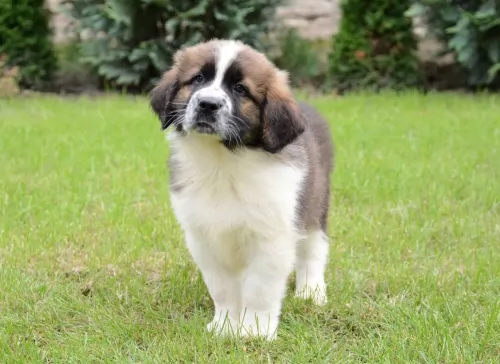 The Moscow Watchdog is related to the mountain dogs and is a very large breed. They are sturdy, muscular and powerful. They have big heads and a thick double coat that sheds profusely four times a year. They have a long tail, an arched chest and an air of confidence.
The Moscow Watchdog is related to the mountain dogs and is a very large breed. They are sturdy, muscular and powerful. They have big heads and a thick double coat that sheds profusely four times a year. They have a long tail, an arched chest and an air of confidence.
He is in the Mastiff family and is smart and trainable. He is not clumsy but has big bones. He is surprisingly agile and active for a dog his size. Unlike the St. Bernard he is not a couch potato. He is also differentiated from the St. Bernard because he does not drool.
These dogs are large but they’ve got a gentle temperament and are good with kids, being playful and energetic with them.
Even though he is a docile dog, you want him trained and socialized, and then he gets along well with other pets too. His sheer size makes it that it is best to supervise him when he’s around small children. He is also a protective dog breed, willing to bond closely to, and protect his human family.
 Your Morkie is such a sweet dog, and that’s to be expected, coming from such sweet parent breeds.
Your Morkie is such a sweet dog, and that’s to be expected, coming from such sweet parent breeds.
He just loves his human family and is friendly and social as well as being loyal. He has quite a bit of attitude, and if you allow it, he’ll develop some horrible small dog syndrome characteristics, such as being snappy, whiny and barking.
Small though he is, training and socialization will do him the world of good and he then lives up to everything wonderful that Morkie dog owners have got to tell you about– playful, friendly fun-loving, jaunty, loving and the cutest little thing there is.
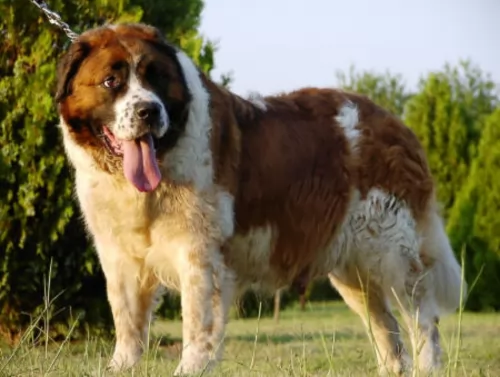 This is a large dog who likes to be involved and busy, even though he is so big. He isn’t suited to city life and being confined to a tiny garden as he needs space.
This is a large dog who likes to be involved and busy, even though he is so big. He isn’t suited to city life and being confined to a tiny garden as he needs space.
They’re independent dogs too and you can leave them alone during the day. He is social, so while you can leave them during the day while you’re at work, he’ll want your attention when you get back. They're such loving, loyal family pets that you owe it to him to make this gentle giant of a dog as happy as can be.
 As a responsible dog owner it is to your benefit to be aware of some of the common dog illnesses that your Morkie can succumb too. Not that he is likely too, as with good care, these robust little dogs can live to be 15 years of age or so.
As a responsible dog owner it is to your benefit to be aware of some of the common dog illnesses that your Morkie can succumb too. Not that he is likely too, as with good care, these robust little dogs can live to be 15 years of age or so.
A dog's lifespan can certainly be impacted by the lifestyle they lead. Some of the common dog illnesses to look out for -
Parvo can be a killer, and that’s why your 8 week old puppy needs to have his parvo vaccination. You’ll find puppies in shelters and puppy mills that get parvo. Dogs contact parvo by coming into contact with an infected dog.
Symptoms include vomiting, diarrhea, lethargy and weight loss. Quick medical treatment can save your dog but it is better to ensure he doesn't get it in the first place. Other diseases that require vaccinations are hepatitis, distemper and rabies.
This is a tick-borne illness brought on by bacteria transmitted by deer ticks that attach to the dog. One of the symptoms is lameness in limbs and a loss of appetite. Without treatment, lyme disease can lead to kidney problems.
Prevent your dog getting bloat by ensuring he doesn’t get ravenous with one meal a day. He then wants to wolf his food down. Rather give him smaller meals that he eats slower to avoid bloat. The stomach swells and can actually twist. If your dog has an enlarged stomach, is restless, salivating and wanting to vomit, get him to the vet immediately.
 Moscow Watchdog is looked upon as a fairly healthy dog breed but there are some risks such as hip dysplasia as well as some other large breed problems.
Moscow Watchdog is looked upon as a fairly healthy dog breed but there are some risks such as hip dysplasia as well as some other large breed problems.
With big dogs like this, hip dysplasia is a threat. Its an hereditary condition where the parent dogs pass down the problematic genes. Hip dysplasia results in inflammation and pain for your pet, and where once he loved to play, he is reluctant to and battles to get up after lying down.
 The Morkie is such a small dog so it won’t require much effort to brush him. Because the hair is thin and fine, you may want to brush him every day just to keep the silky hair from matting.
The Morkie is such a small dog so it won’t require much effort to brush him. Because the hair is thin and fine, you may want to brush him every day just to keep the silky hair from matting.
Many Morkie owners opt to have their Morkie’s trimmed at a professional dog parlor. Check around his eyes and check inside his ears to make sure both are clean and free from infection.
Little dogs always have trouble with their teeth, so make sure to check these regularly. Keep his nails trimmed too as if they grow long they can hook onto things and can cause injury.
The Morkie is an energetic little dog, but because he is small he isn’t going to require too much exercise. A walk now and then will delight him and some ball games indoors or outside. He is a dog that will settle happily into city- or country life, so long as he is with his beloved owner.
Morkies love their food and they can tend to gobble it up. Rather give your Morkie smaller meals than one main meal as he wolfs it down, causing digestive problems.
If you feed him kibble, make sure the packaging is marked for little dogs and make sure its the best there is to ensure he gets the right amount of minerals and vitamins in.
As a treat boil some chicken, brown rice, pasta and vegetables and chop it up very finely and add it into his kibble from time to time.
Make sure your Morkie can easily reach his bowl of fresh, cool water.
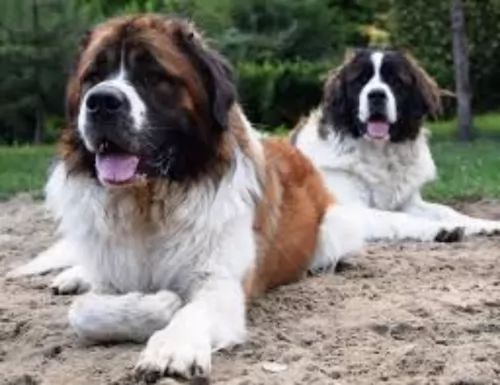 The Moscow Watchdog is a giant sized dog and will require a lot of regular exercise, and apart from a fairly brisk daily walk, will also need games and a run in the park.
The Moscow Watchdog is a giant sized dog and will require a lot of regular exercise, and apart from a fairly brisk daily walk, will also need games and a run in the park.
As a large dog requiring a regular dose of physical exercise as well as mental stimulation, he is better suited to life in the country or at least where there is a large garden.
The Moscow Watchdog has a medium length coat, and as a moderate shedder, you will need to simply brush his coat twice a week to remove loose hair. There is no professional grooming required for these dogs.
Homemade food is always a treat for a dog, but if you’re feeding your Moscow Watchdog commercially manufactured food because of the sheer convenience it provides, make sure the packaging says 'large- or giant dog breed' food. This way you know your pet is getting the right amount of minerals and vitamins for his size.
Always buy the best quality food to avoid giving your pet an overdose of colorants and preservatives. Try and give your pet some home-made food such as boiled chicken, some brown rice or pasta and some cooked vegetables such as sweet potatoes, carrots and spinach. These can be added to his kibble every now and again.
A simple diet like this agrees with your pet and he will be healthy and happy with his lot.